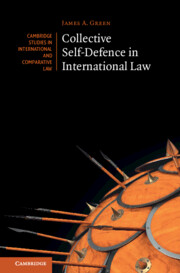Book contents
- Collective Self-Defence in International Law
- Cambridge Studies in International and Comparative Law: 184
- Collective Self-Defence in International Law
- Copyright page
- Dedication
- Contents
- Acknowledgements
- Table of Treaties
- Table of Cases and Arbitral Awards
- Introduction
- 1 Delineating Collective Self-Defence
- 2 The History and Development of Collective Self-Defence
- 3 The Requirements Shared by Individual and Collective Self-Defence
- 4 The Purported Declaration and Request Requirements for Collective Self-Defence
- 5 The Issuer of a Collective Self-Defence Request
- 6 The Manner and Form of a Collective Self-Defence Request
- 7 Collective Self-Defence Treaty Arrangements
- 8 The Relationship between Collective Self-Defence and Military Assistance on Request
- Conclusion
- Bibliography
- Index
- Cambridge Studies in International and Comparative Law
5 - The Issuer of a Collective Self-Defence Request
Published online by Cambridge University Press: 04 January 2024
- Collective Self-Defence in International Law
- Cambridge Studies in International and Comparative Law: 184
- Collective Self-Defence in International Law
- Copyright page
- Dedication
- Contents
- Acknowledgements
- Table of Treaties
- Table of Cases and Arbitral Awards
- Introduction
- 1 Delineating Collective Self-Defence
- 2 The History and Development of Collective Self-Defence
- 3 The Requirements Shared by Individual and Collective Self-Defence
- 4 The Purported Declaration and Request Requirements for Collective Self-Defence
- 5 The Issuer of a Collective Self-Defence Request
- 6 The Manner and Form of a Collective Self-Defence Request
- 7 Collective Self-Defence Treaty Arrangements
- 8 The Relationship between Collective Self-Defence and Military Assistance on Request
- Conclusion
- Bibliography
- Index
- Cambridge Studies in International and Comparative Law
Summary
It is clear that, under customary international law, the state that has suffered an armed attack must request aid before other states can provide it with that aid in the exercise of collective self-defence. There are a range of factors that need to be considered that do (or, at least, may) have a bearing on the ‘validity’ of that request. This chapter analyses perhaps the most controversial of them: the question of who can issue a collective self-defence request. In so doing, it examines the view that only states can request aid in collective self-defence and, indeed, further asks whether the issuer of the request must be a UN member. The bulk of the chapter then examines how one identifies the de jure government of the state for the specific purpose of issuing a collective self-defence request. A traditional reference point for the recognition of governments in international law generally has been the effective control of territory. However, this is of minimal – if any – importance to the identification of the entity that can request aid in collective self-defence. Instead, other factors, such as democratic and constitutional legitimacy, are of greater importance.
Keywords
- Type
- Chapter
- Information
- Collective Self-Defence in International Law , pp. 169 - 203Publisher: Cambridge University PressPrint publication year: 2024

